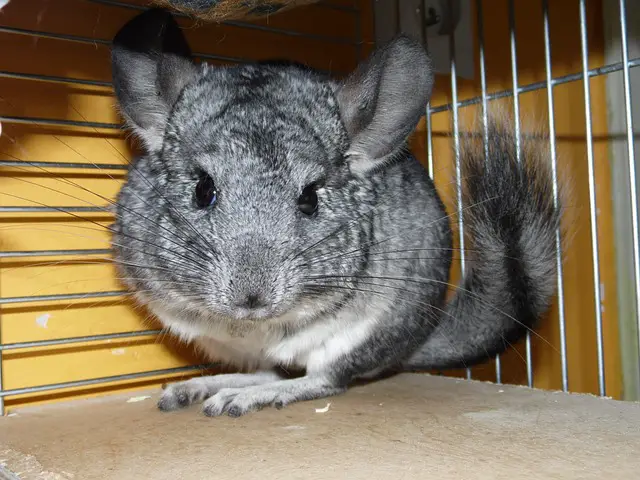Chinchillas are cute and furry animals native to the Andes Mountains in South America. They are known for their soft and dense fur, which makes them popular as pets. However, like all pets, chinchillas require proper care and attention to ensure their health and well-being.
Providing enough water is one of the most important aspects of caring for a chinchilla. Water is essential for a chinchilla’s survival and is crucial in maintaining its health.
However, like all things, too much of something can be harmful. This raises the question: can chinchillas drink too much water?
Can Chinchillas Drink Too Much Water?
Understanding Chinchilla Water Needs
Chinchillas are small animals that require fresh water to stay hydrated. They are desert animals and have adapted to survive in dry environments.
As a result, they don’t drink as much water as other animals of the same size. As a result, Chinchillas need access to clean water to prevent dehydration, which can cause serious health problems.
How Much Water is Too Much for Chinchillas?
While chinchillas need water to survive, they can drink too much, leading to overhydration. Overhydration occurs when a chinchilla drinks more water than their body can handle.
This can cause an imbalance of electrolytes in their body, leading to health problems such as seizures, coma, and even death.
Chinchillas should drink about 10-15% of their body weight in water each day. For example, a 500-gram chinchilla should drink about 50-75 milliliters of water per day.
If a chinchilla drinks more than this, it may indicate an underlying health problem.
Dangers of Overhydration in Chinchillas
Overhydration can cause serious health problems in chinchillas. When a chinchilla drinks too much water, it can lead to water toxicity.
This condition can cause seizures, coma, and even death. Overhydration can also cause a chinchilla’s body to become bloated, which can pressure its internal organs and cause damage.
To prevent overhydration, chinchilla owners should monitor their pet’s water intake and ensure they can always access fresh water.
If a chinchilla drinks more water than usual, it may indicate an underlying health problem and should be taken to a veterinarian for evaluation.
In conclusion, chinchillas need access to fresh water at all times to prevent dehydration, but they can drink too much water, leading to overhydration and severe health problems.
Chinchilla owners should monitor their pet’s water intake and seek veterinary care if they drink more water than usual.
Signs of Overhydration in Chinchillas
Chinchillas need water to stay healthy, but too much of a good thing can be harmful. Overhydration, or drinking too much water, can lead to serious health problems for chinchillas. Here are some signs that your chinchilla may be overhydrated:
- Wet fur or bedding: If your chinchilla’s fur or bedding is wet, it may be a sign that they are drinking too much water. Wet fur can lead to skin problems and infections, so addressing this issue promptly is essential.
- Lethargy: Overhydrated chinchillas may become lethargic or less active than usual. They may also appear weak or uncoordinated.
- Diarrhea: Too much water can cause diarrhea in chinchillas. This can lead to dehydration and other health problems if not addressed promptly.
- Loss of appetite: Overhydrated chinchillas may lose their appetite or refuse to eat. This can lead to malnutrition and other health problems.
If you notice any of these signs in your chinchilla, taking action immediately is essential. Contact your veterinarian for advice on how to proceed. Sometimes, your chinchilla may need medical attention to address the underlying cause of their overhydration.
Preventing Overhydration in Chinchillas
Proper Hydration for Chinchillas
Chinchillas require access to clean water at all times. They are desert animals and have evolved to get the most moisture from their food.
Therefore, providing them with a balanced diet that includes hay, fresh vegetables, and a limited amount of pellets is essential.
It is recommended that chinchillas drink between 5 and 10 ml of water per day. However, it is essential to monitor their water intake to ensure they are not overhydrated.
Overhydration can lead to serious health problems, including diarrhea, bloating, and even death.
Watering Techniques for Chinchillas
To prevent overhydration, it is essential to provide chinchillas with fresh, clean water in a suitable container. The container should be made of glass or ceramic and heavy enough to prevent tipping.
Using a water bottle with a sipper tube is recommended to provide water to chinchillas. This method prevents the water from becoming contaminated and makes it easier to monitor their water intake.
It is essential to clean the water bottle regularly to prevent the growth of bacteria. The sipper tube should be cleaned with a small brush to remove buildup.
In conclusion, preventing overhydration in chinchillas is crucial for their health and well-being. It is essential to provide them with a balanced diet and access to clean water in a suitable container. Monitoring their water intake and using a water bottle with a sipper tube can help prevent overhydration.
Conclusion
In conclusion, chinchillas always need access to water, but it is essential to ensure they do not drink too much. Overhydration can lead to serious health problems, including water toxicity and bloating.
Chinchillas should be provided with fresh water daily, and their water bottles should be checked regularly to ensure they are working correctly. It is also essential to monitor their water intake to ensure they do not drink too much.
If a chinchilla shows signs of overhydration, such as lethargy, loss of appetite, or difficulty breathing, it is essential to seek veterinary care immediately.
Overall, providing chinchillas with access to water is essential for their health and well-being. By monitoring their water intake and ensuring that they do not drink too much, chinchilla owners can help keep their pets healthy and happy.




